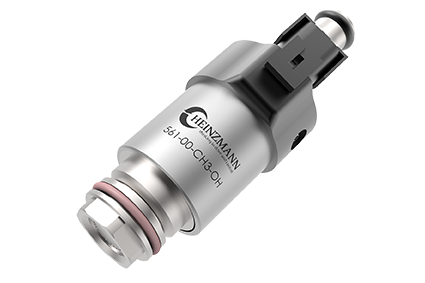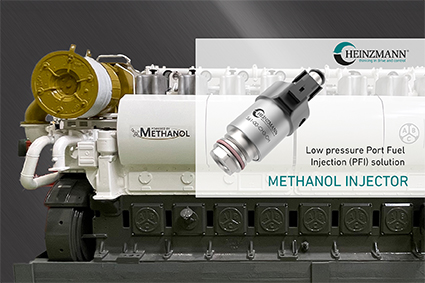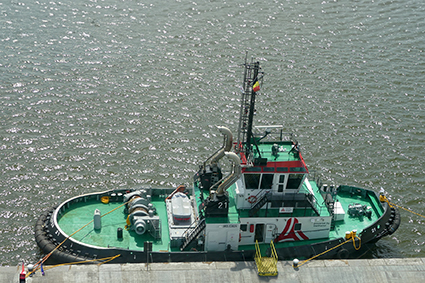August 2024
HEINZMANN offers solutions for enabling marine engines for methanol operation
Schönau, June 2024 – Together with engine manufacturer Anglo Belgian Corporation nv (ABC), HEINZMANN has developed and successfully tested a fuel injection system for using methanol as a fuel on four stroke engines in dual-fuel operation. HEINZMANN offers now a complete solution that can be implemented cost-effectively for the newbuilds as well as for the conversion of medium speed engines in power range 500 - 2000 kW, preferably for marine propulsion and auxiliary gensets. In a first project, a tugboat was recently successfully put into operation in the Port of Antwerp as part of the European-funded FASTWATER project.
In an effort to reduce or avoid GHG emissions in the maritime sector, new, synthetically produced fuels aim to significantly lower climate-damaging emissions. Compared to conventional fossil fuels, methanol offers considerable advantages as a low-carbon fuel and is increasingly the focus of developments for sustainable propulsion solutions in shipping.
While battery systems and electric drives dominate in automotive applications, for example due to the comparably lower ranges of less than 1000 km, significantly higher ranges must be covered in ship operations, particularly in deep sea journeys, without refuelling. Internal combustion engines still remain the first choice here. In addition to the available tank capacity, the energy density and storage conditions of the fuel also play an important role. The most promising candidate is currently synthetically generated methanol, which has properties similar to those of conventional fuels in terms of handling and usage. This allows the continued use of existing supply chains and also requires relatively small modifications to the engines and infrastructure, which also plays a role in terms of costs during the conversion of existing engines as the largest market.
A major advantage in the use of methanol as a fuel for marine engines lies in its easy handling: compared to other low carbon fuels such as hydrogen or natural gas, methanol is liquid at room temperature and can be transported and stored similarly to diesel fuel, but with only around half the energy density compared to diesel fuel. However, for applications in inland waterways and coastal operations, this is not a significant issue.
The necessary rapid conversion of existing engines in line with the agreed climate targets ideally requires a liquid fuel, that can use the existing tank and fuel lines infrastructure with as little adjustments as possible and necessitates as few modifications to the engine as possible. Together with the engine manufacturer ABC, HEINZMANN has developed and successfully tested a fuel injection system, for using methanol as a fuel on four stroke engines in dual-fuel operation. This means that a small amount of diesel fuel is still used in methanol operation to ignite the methanol. Up to 70% of the fuel requirement is covered by methanol here. Currently, development activities are focussing on further minimising the diesel use.
The core component of the methanol fuel system is the electrically actuated methanol injector, which precisely injects the fuel into the intake manifold for each cylinder (Port Fuel Injection). The optimal atomisation of the fuel is very important here, which proves to be a challenge with methanol due to its high heat demand for evaporation. To address this, HEINZMANN has found a suitable nozzle design that offers the desired spray characteristics.
Together with the dual-fuel control unit, fuel pump, necessary sensors, safety functions, and wiring, HEINZMANN offers a complete solution for new engines as well as for retrofitting of medium speed engines with power outputs of approximately 500 - 2000 kW, preferably for marine propulsion and auxiliary gensets. This solution can be implemented cost-effectively. However, it is important that the injector's spray pattern is adapted to the spatial conditions in the intake area of the cylinder head to avoid harmful condensation. For new engines, the design of the cylinder head can be optimized for methanol combustion from the outset.
In an initial project, a harbor tugboat was recently successfully commissioned in the Port of Antwerp as part of the European-funded FASTWATER project, with all project goals achieved (www.fastwater.eu). The next step involves preparing for commercialization, with further customer orders already placed.

HEINZMANN PFI-Methanol-Injector
(Image source: © Heinzmann GmbH & Co. KG)

Methanol version of the ABC-DZ engine
(Image source: © 2024 Anglo Belgian Corporation nv)

Methanol-powered tugboat of the Port of Antwerp
(Image source: © Heinzmann GmbH & Co. KG)
Contact and press requests: